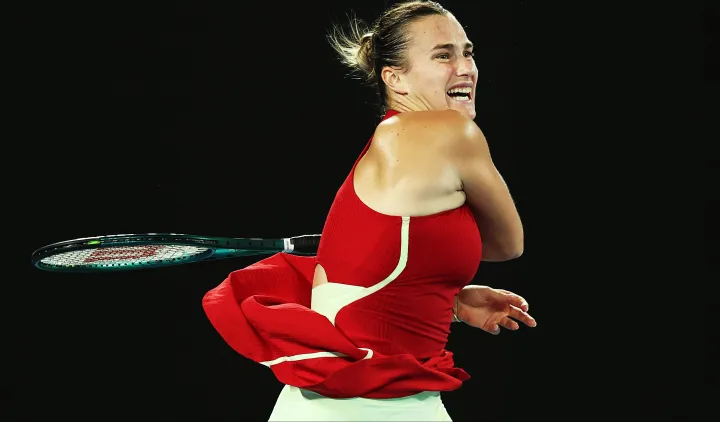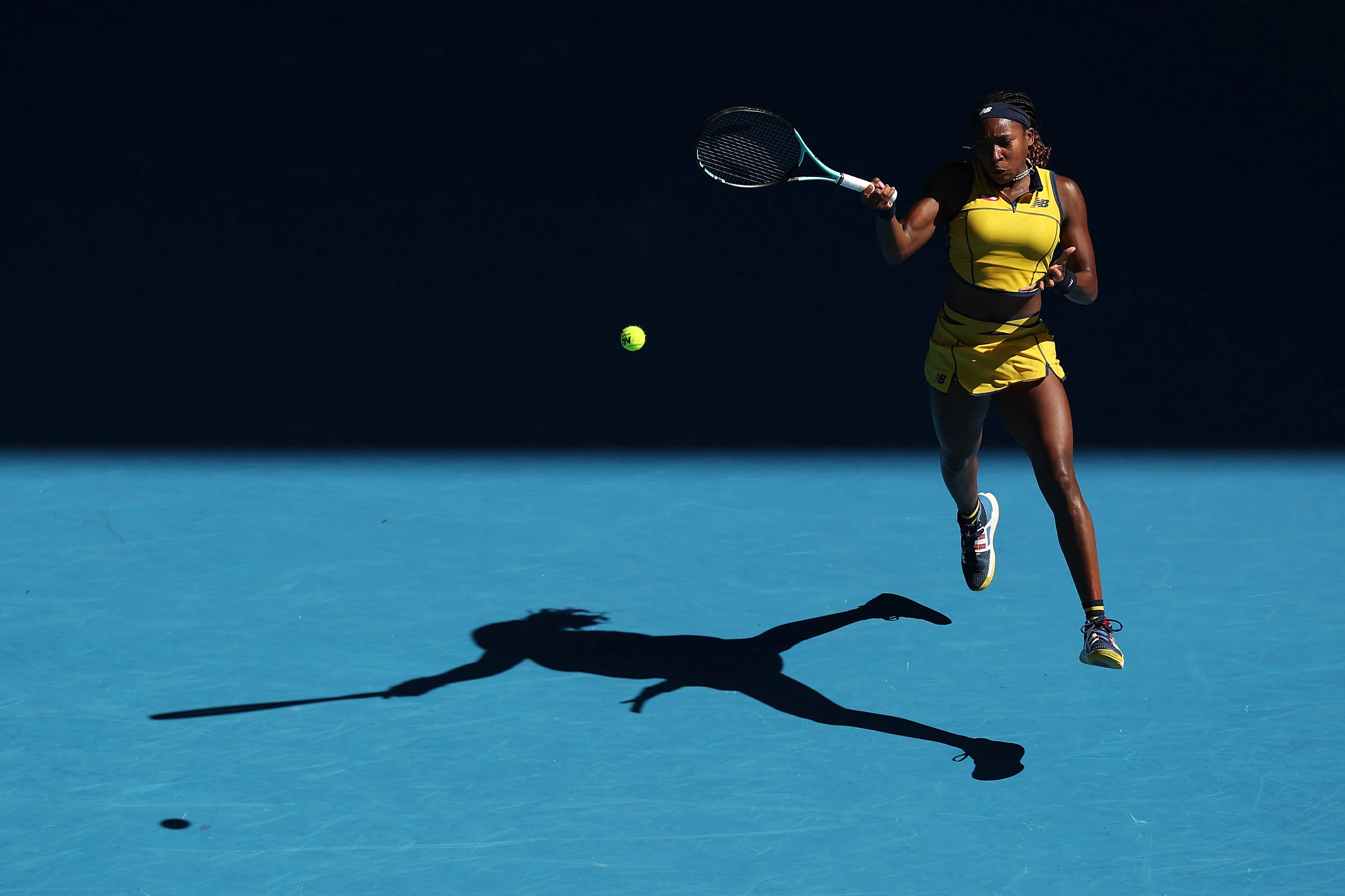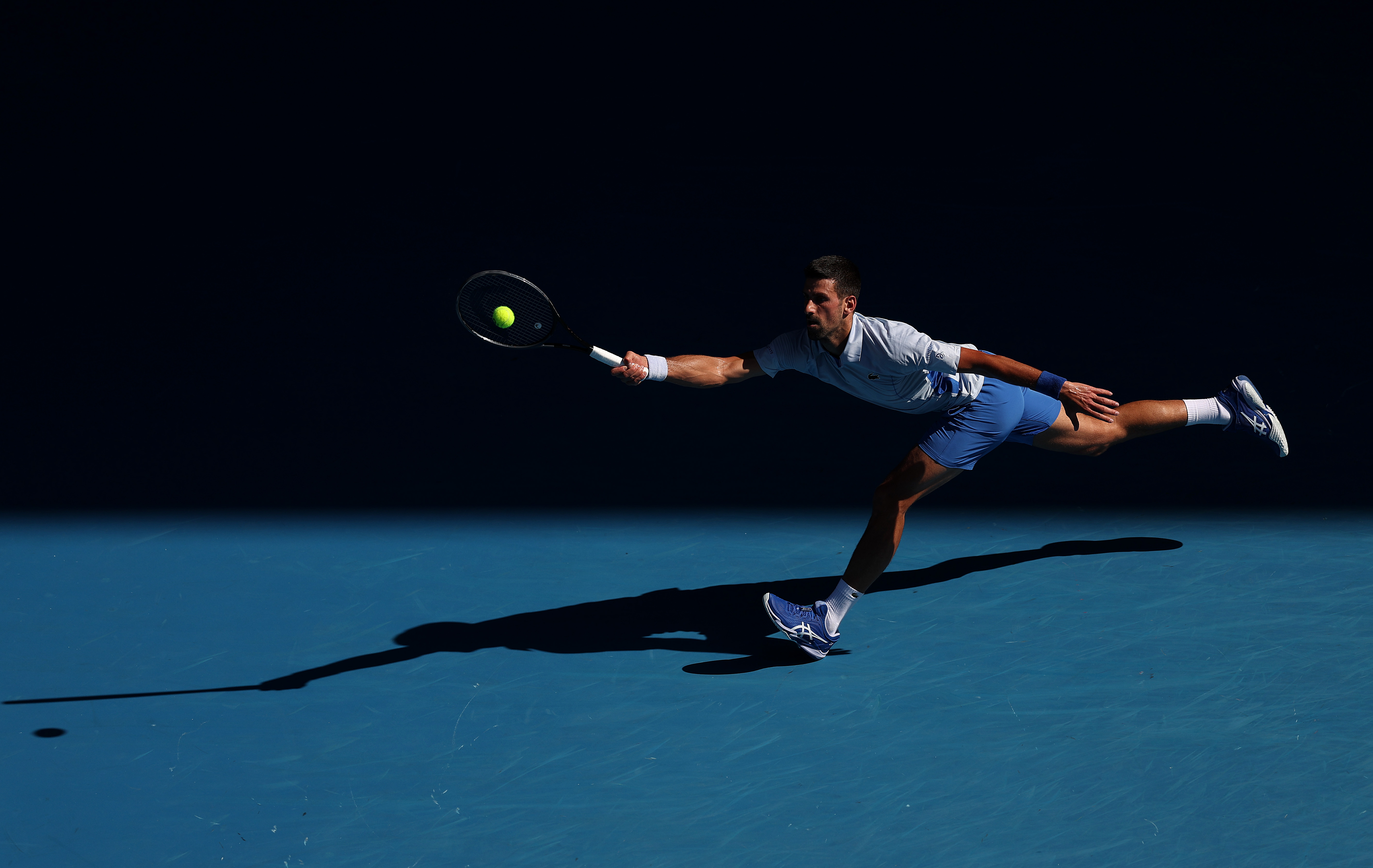ANALYSIS
Serving for parity — women have every right to the equal pay they get at tennis Grand Slams

Women are not as well paid as men in tennis outside of the four Grand Slams. Yet people get angry about equal pay in the sport’s premier tournaments.
The 2024 Australian Open, the first Grand Slam of the year, is reaching its climax in Melbourne and in between some fantastic tennis, a familiar refrain has been heard — a debate over equal prize money.
A simple scroll through the comments section of most tennis stories on just about any platform highlights the issue.
This week, Carlos Alcaraz was asked which players he enjoys watching, and he rattled off the names of a few of his rivals — Novak Djokovic, Jannik Sinner and Daniil Medvedev.
He was pushed by the interviewer (former Grand Slam winner Jim Courier) about players in the Women’s Tennis Association (WTA) but didn’t name any.

Coco Gauff of the United States plays a forehand in the quarterfinals singles match against Marta Kostyuk of Ukraine at the 2024 Australian Open at Melbourne Park on 23 January 2024. (Photo: Daniel Pockett / Getty Images)
It was a “so what?” moment, but it allowed trolls to come out in numbers and attack the equal pay system at the Grand Slams as unfair because the women “work less” for the same pay.
Almost all the comments I saw on platforms that ran Alcaraz’s comments were along the lines of, “He’s only saying what most of us think, so well done…”
That assumption is predicated on the idea that because women’s matches are the best of three sets, and the men’s the best of five, this invalidates equal pay.
Entertainment
But let’s look at the facts.
The Grand Slams sell their broadcast rights and sponsorship as a package deal — for men’s and women’s doubles, mixed doubles and even wheelchair tennis. Ticketing is similarly egalitarian.
Outside of the Grand Slams, the men also play the best of three sets in a match at every tournament, yet that’s where the real pay discrepancy exists.
The Association of Tennis Professionals (ATP) Tour has a far greater prize money pool than the Women’s Tennis Association (WTA) tour. In 2023, the total prize fund for all tournaments on the ATP Tour was $217.9-million.
In 2022 the WTA prize fund was 75% less than than the . This excludes the Grand Slams.

Alexander Zverev of Germany celebrates winning match point during the quarterfinals singles match against Carlos Alcaraz of Spain in the 2024 Australian Open at Melbourne Park on 24 January 2024. (Photo: Cameron Spencer / Getty Images)
That means men do earn significantly more than women over the course of a season, while also playing only three sets.
It’s just at the Grand Slams that this equality of pay and discrepancy of sets exists. And it riles so many people, almost exclusively men.
Market forces dictate prize funds, which are earned from sponsorships, gate takings and most vitally, broadcast rights in most sports. This reflects supply and demand to an extent, but it’s not always that straightforward.
The Saudi-backed LIV Golf, for instance, does not have significant broadcast rights or sponsorship deals, and it pulls low numbers of spectators. But it is funded by the Saudi Public Investment Fund, which is bankrolled by the oil-rich state, and is worth $700-billion. It doesn’t need to make money to survive.
The old trope that women’s tennis isn’t as good as men’s is also a skewed argument.
It’s almost certain that no woman would make the men’s top 200 (and probably even 500), but that doesn’t equal “unwatchable” or less entertaining.
Take college football (gridiron) in the US. It’s watched by millions, rakes in billions in broadcast rights and is highly entertaining to its fans.
But only 1.6% of college football players make it to the National Football League (NFL). Every college football team would be smashed by a pro team.
In South Africa, first-team schoolboy rugby matches featuring the top 50 schools in the country regularly attract 8,000-15,000 spectators. The games are on TV and streamed on digital platforms and have a huge following. But, let’s be honest, none of those teams would beat a provincial under-20 team.
In boxing, there are weight divisions. The best welterweights in the world — think of Sugar Ray Leonard and Floyd Mayweather — would never have reached anywhere close to the pinnacle of the sport if weight categories didn’t exist.

Novak Djokovic of Serbia during the quarterfinals singles match against Taylor Fritz of the United States at the 2024 Australian Open at Melbourne Park on 23 January 2024. (Photo: Julian Finney / Getty Images)
The success of college football and schoolboy rugby is not down to the quality of the product. They are not in the same class as the elite men’s product, but within their boundaries are excellent products.
The success of college football and schoolboy rugby (and many others) is a result of emotional connections to the sport at that level.
That is the folly of only weighing the quality of a sport, or category of sport, against the pinnacle of men’s sport (in these examples).
Context
Women’s tennis, golf, soccer, cricket, etc, can’t be judged on what the result would be if they played against men. They have to be measured on their merits within their context.
College football, schoolboy rugby and women’s and men’s professional tennis are the best versions of that product in that sphere.
Women’s professional tennis at a high level is a fine sport to watch when there are two equally matched players on the court. Skill and finesse, poise, grace, athleticism and supreme mentality are on display.
Just because women don’t hit the ball as hard as men or move quite as quickly doesn’t mean it’s inferior entertainment.
Market forces already dictate that female tennis players are paid less than their male counterparts — the numbers are there to prove it.
But the top women in tennis are well paid in the realms of female sport. According to a report in Forbes last year, 12 of the top 20 earning women in sport played tennis.
Poland’s Iga Świątek was the highest-paid female athlete on the planet in 2023, earning more than $23-million, which includes endorsements in addition to prize money.
That doesn’t mean that the WTA should stop working to increase the money for its athletes and keep pushing for equal pay. If it didn’t fight their corner, who would?
Former world No 1 Venus Williams used her platform and status as a huge star in the sport to fight for equal pay at the Grand Slams. She was instrumental in the change at Wimbledon, and her recollection of how the change came about is instructive.
“So, I was playing this tournament, Wimbledon,” Williams told the WTA website last year. “I was arriving at the finals. Every year they have this meeting with the Grand Slam Committee. It’s very proper.
“You go into this room, it’s a boardroom. It’s a little bit boring, to be honest, but I didn’t say that. It’s not on record. It’s off the record, everybody.
“But you go in, they serve tea, it’s very English. You know how the English are more buttoned up than us loud Americans. There are a lot of formalities. We ask for equal prize money.
“Then a few weeks later or months, whatever the timeframe was, they would just say no. It was year after year after year since the Open Era that this was going on.
“At that point, I went into this room and I asked everyone to close their eyes. I said, ‘Now that your eyes are closed, you don’t know if that person next to you is a man or a woman, but everyone’s heart beats the same way. Would you want your daughter or your sister or your mother or your wife or a loved one that was a woman to be paid less?’
“Then I left. I bounced. I had to go. I didn’t stay for the whole meeting. Lots of people think that was impactful. It was just the truth.
“A lot of the time you can’t beat the truth. When you stand up for what’s right — that’s what my mom was all about. I learned that from her. I think that’s why I spoke out — because my mom said, ‘There’s something wrong, you stand up for it.’ ”
Market forces will ultimately dictate the remuneration in women’s tennis, as they already do. It doesn’t mean that women should accept the status quo. DM




















 Become an Insider
Become an Insider
Agreed – it should be down to market forces – if people want to watch women’s sport the pay will increase naturally. Statistically men watch a great deal more sport than women which will probably result in mens sport always being more popular – women don’t support their own product very well. If the grand slams were able to sell the TV rights for men and women separately there is no doubt the mens product would sell for vastly more than the female product.
I have no problem with females receiving the same prize money in the Grand Slams. Of course too , you need be 100% born female.
It is amazing that the writer assumes he is taking the moral high ground by defending women’s equal pay at Grand Slam tournaments – by bringing in the argument that they are not equally paid outside of Grand Slams. And ignoring the fact that they do not do the same work as men (by not playing best of 5 sets) in said Grand Slams.
I have no problem with the same pay – if they play best of 5 sets – but how do you justify the “less work for equal pay” part of the equation, Craig?
How many club or provincial matches involving women’s cricket, rugby or soccer teams has the author personally attended in 2023?
The answer is probably zero, rendering the content above moot.
Surely the fact that men’s matches are longer, contestants require greater fitness and more training, is an argument for more pay in the Grand Slams?
I live for those “epics” – 4 hour plus matches. Some of those greatest matches of all time – and there are too many to mention. An absolute rollercoaster of emotions, unable to leave the screen for even a few minutes, players leaving absolutely everything on the court – totally exhausted.
And I’m sorry – a typical womens match of just 71 minutes just leaves me cold. Absolutely no sense of drama.
I’m all for equal pay – but I would also love to see the women play some 5 set classics ….
Unfortunately the argument holds no water, because women’s tennis is currently just too boring. The top10 classic finals of the past decade will all be men’s. If you don’t believe me, look at the black market prices for a women’s final vs the men’s! Another straight set done and dusted affair today came as a surprise to no one.